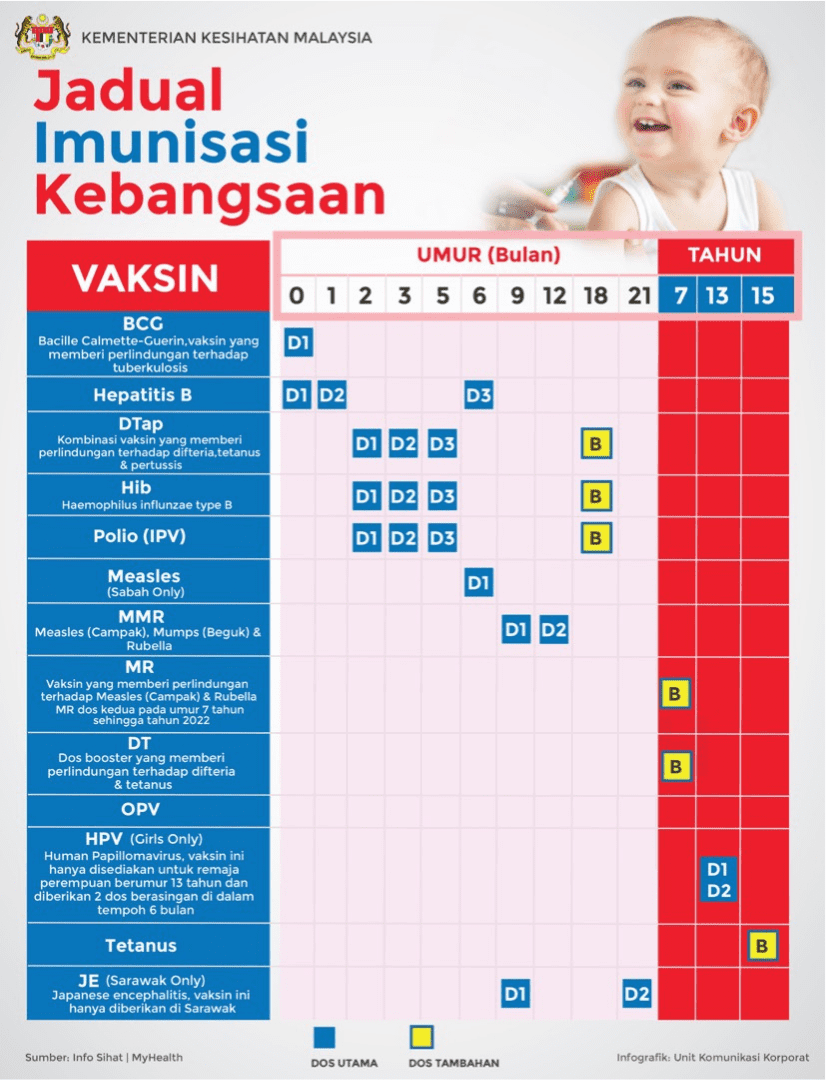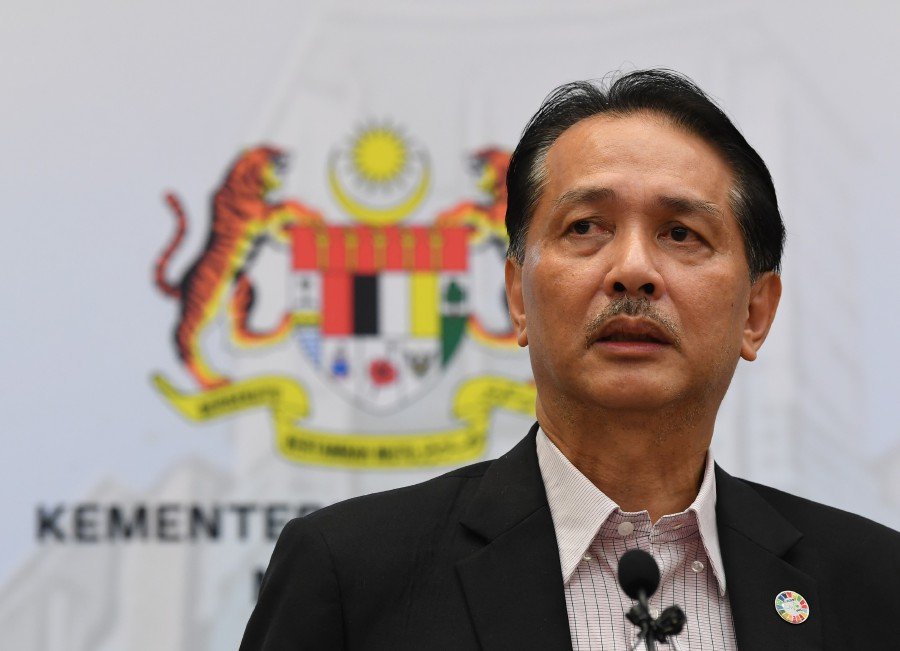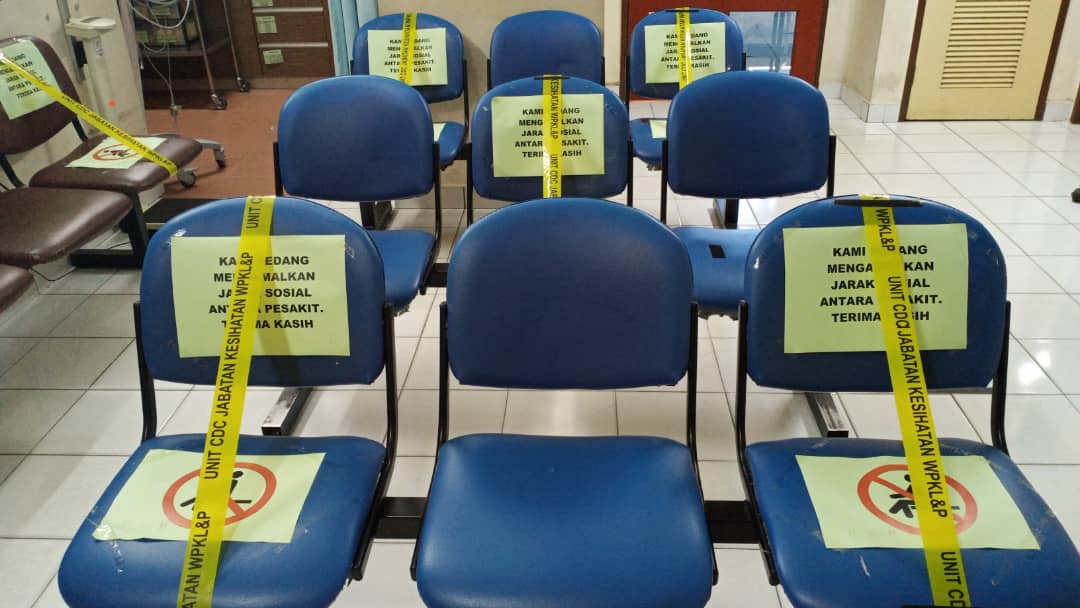IFL Urges Parents To Not Skip Or Delay Their Baby's Immunisation Due To COVID-19 And MCO
"Delaying or skipping the immunisation schedule can leave baby vulnerable and defenceless against the multitude of germs intent on infecting baby's body," the Ministry of Health's programme said.
While the country battles COVID-19, it appears Malaysian parents have stopped bringing their babies for their much-need immunisations due to the fear of catching COVID-19 and confusion over MCO directives
Skipping on immunisation can significantly increase your baby's risk of developing a number of serious vaccine-preventable diseases, according to an official expert-driven community education initiative under the Minister of Health (MOH) aimed at promoting immunisation to prevent vaccine-preventable diseases.
"Furthermore, it would be an additional blow to the nation's already-stressed economy, healthcare system, and societal resources if we also had to deal with major outbreaks of measles, diphtheria or polio while still struggling to bring COVID-19 under control," the Immunise4Life Secretariat wrote in an email to SAYS.
MOH's Immunise4Life (IFL) programme said that the World Health Organization (WHO) has recognised disruptions to routine childhood immunisation as a real threat.
"Our own director-general of Health Dr Noor Hisham Abdullah has also highlighted the same and advised parents against putting off their babies' immunisation during the COVID-19 pandemic," it said.
In an effort to help amplify the Health D-G's message, IFL has provided guidance for parents to safely and confidently meet their babies' immunisation needs on time.
Ministry of Health's national immunisation schedule.
Image via Immunise4Life/Ministry of Health/SAYSNoting that questions about the clinics being safe to take your child amidst the pandemic are valid concerns, IFL stressed that what's more important is asking if "Isn't it riskier to miss baby's immunisation?"
"The answer is a resounding 'YES!'" IFL, the programme under MOH, said.
"All the vaccines, except HPV, need to be given within the first 18 months of life. It is important that the baby receives all the doses required for each vaccine at the right times to be fully protected," IFL said.
"Delaying or skipping the immunisation schedule can leave baby vulnerable and defenceless against the multitude of germs intent on infecting baby's body."
Recently, Dr Noor Hisham advised parents not to put off their babies' immunisation, saying that a delay in immunisation can increase the risk of vaccine-preventable diseases such as measles and polio
"In our effort to break the chain of COVID-19 infection with the recommendations from the World Health Organization (WHO), children's immunisation schedule must be followed to maintain a high level of herd immunity," he said on Friday in conjunction with World Immunisation Week from 24 to 30 April.
"To date, there have been four polio cases confirmed through laboratory tests as well as two polio compatible cases that met the clinical features of polio, all of which occurred in Sabah," he said.
"The majority of these cases were due to not getting the vaccine injections," Dr Noor HIsham said while recording an increased number in cases of pertussis (whooping cough).
Dr Rozita Ab Rahman, senior principal assistant director at MOH's Family Health Development Division, has shared a few tips on how parents can safely and confidently bring their babies to the clinic
"First and foremost, parents need to adhere to their immunisation appointments. We have arranged a staggered appointment for all our patients. We urge you to arrive on time, at the appointed time. Your cooperation will enable the staff to space out all visits and avoid crowding," she said.
"Be sure to bring along baby's immunisation record book. In case the police stop you along the way, show them the book to prove the purpose of your journey. The police will let you through."
Healthcare workers at the clinics will conduct a general screening on parents and their baby.
"Once you arrive at the clinic, the staff will take your temperature at the triage counter. They will also ask if your baby or you are having any symptoms of influenza-like-illness (such as fever, runny nose, cough, sore throat) and shortness of breath," she explained.
"In addition, they will enquire whether you have returned from abroad recently or have been in contact with any COVID-19 patients. Please answer truthfully during this screening."
If you pass the screening stage, you will be permitted into the clinic.
From this point on, make sure to disinfect your hands with your sanitiser that are available at the clinics and observe physical distancing of at least one-metre from the nearest patient while awaiting your turn.
"Only one person – either the mother or the father – will be allowed to bring the baby into the vaccination room. This keeps the number of people present to the minimum and prevents congestion," Dr Rozita said.
"Baby will still receive the usual high-quality, personalised care and attention. However, time spent in the clinic will be kept to a minimum. Parents and their babies come in, get the jab and go."
Physical distancing measure at MOH clinics (waiting area).
Image via Immunise4Life/Ministry of Health/SAYSDr Zulkifli Ismail, IFL chairman, also encouraged parents to follow the immunisation schedule despite the implementation of the MCO
"MOH's decision to continue providing routine immunisation services during the MCO is in line with WHO's recommendations. After all, local transmission of COVID-19 in our country is still under control and our health system capacity remains intact," according to Dr Zulkifli.
"However, if parents wish, they have the option of taking their children to a private clinic for immunisation."
Both Dr Rozita and Dr Zulkifli agreed that while it is important to stop the spread of COVID-19, it is equally crucial to continue protecting our children from vaccine-preventable diseases.


